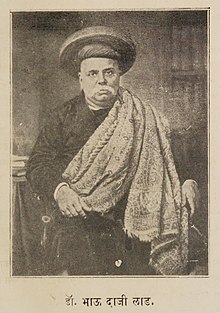- 1 2 3 4 5 This article incorporates text from a publication now in the public domain : Chisholm, Hugh, ed. (1911). "Bhau Daji". Encyclopædia Britannica . Vol. 3 (11th ed.). Cambridge University Press. p. 845.
Dr. Bhau Daji Lad | |
|---|---|
 | |
| 3rd and 4th Sheriff of Bombay |
| International | |
|---|---|
| National | |
| People | |